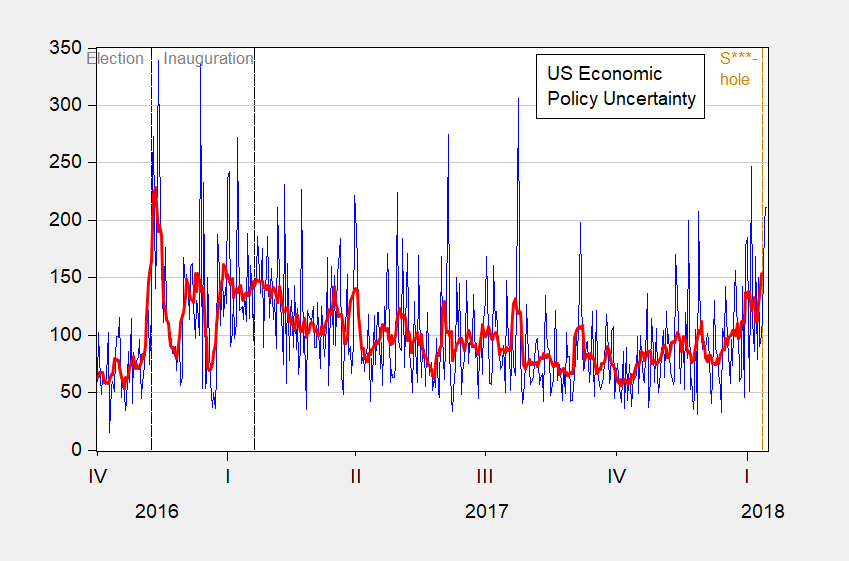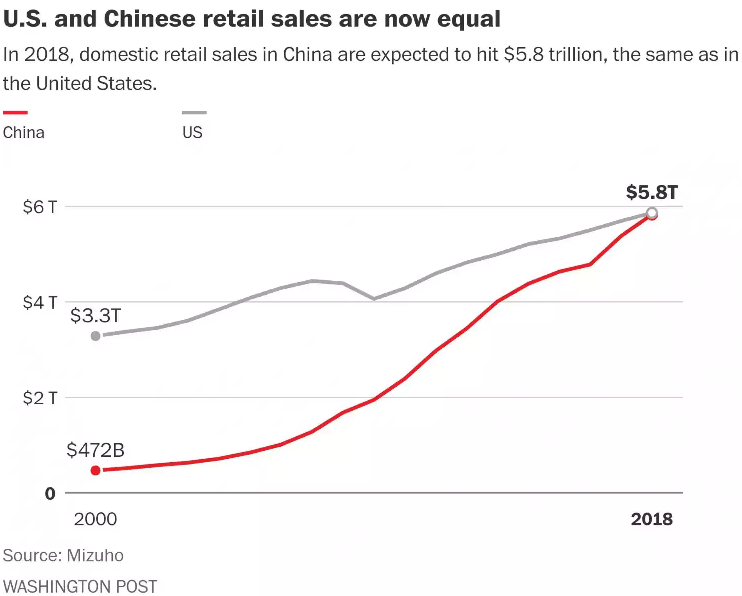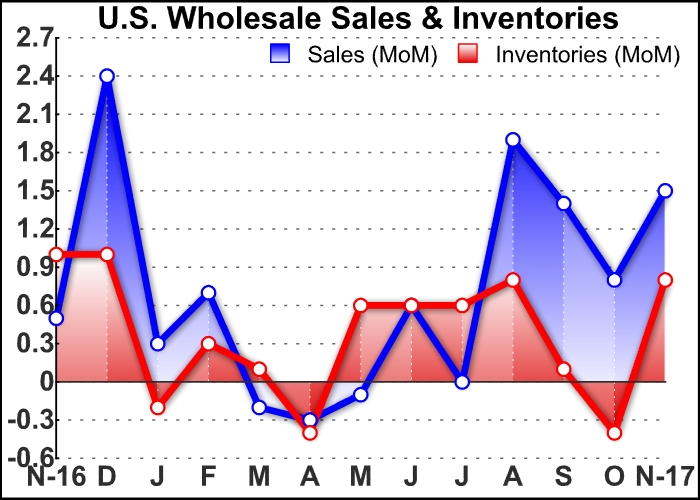The exuberance in the US stock market of late may or may not be irrational, but the party atmosphere in the value corner of equities (companies that are inexpensively priced) is subdued vs. the celebratory surge for growth shares (firms expected to grow at above market rates). Although both measures of US companies in the large-cap space are posting solid gains, the gap in favor of growth has become conspicuously wide lately.
Continue reading
Macro Briefing: 16 January 2018
Risk of US government shutdown looms as Jan. 19 deadline approaches: CNN
Turkey’s president warns of attack against US-backed rebels in Syria: Reuters
Oil rises three-year high, supported by global growth and production cuts: Reuters
Wall Street eyes higher inflation in 2018: Bloomberg
Research claims “single actor” lifted Bitcoin to $1000 from $150: TechCrunch
China’s crackdown on Bitcoin accelerates: CNBC
Boeing unveils supersonic plane design for speeds up to Mach 5: Fox
US policy uncertainty is rising: Econobrowser
US Stocks Top Weekly Performance List As REITs Sink
US equities led most markets higher last week, posting the strongest gain among the major asset classes, based on a set of exchange-traded products. Meanwhile, real estate investment trusts (REITs) in the US suffered the biggest weekly loss, extending a slide for this yield-sensitive sector in the wake of rising Treasury yields.
Continue reading
Macro Briefing: 15 January 2018
US immigration deal’s prospects fade in wake of Trump comments: Fox
Thousands flee in Philippines on warnings of imminent volcano eruption: CNN
Hawaii issues false alert about missile attack: New York
Euro reaches three-year high against US dollar: Reuters
US retail spending rises 0.4% in Dec, matching expectations: RTT
US core consumer inflation in Dec rises the most in 11 months: Reuters
Nov business inventories in US post biggest rise since Aug: Dow Jones
China’s retail sales expected to match US spending in 2018: WaPo
Book Bits | 13 January 2018
● When: The Scientific Secrets of Perfect Timing
By Daniel H. Pink
Summary via publisher (Riverhead Books)
Drawing on a rich trove of research from psychology, biology, and economics, Pink reveals how best to live, work, and succeed. How can we use the hidden patterns of the day to build the ideal schedule? Why do certain breaks dramatically improve student test scores? How can we turn a stumbling beginning into a fresh start? Why should we avoid going to the hospital in the afternoon? Why is singing in time with other people as good for you as exercise? And what is the ideal time to quit a job, switch careers, or get married?
Continue reading
Momentum Continues To Dominate Factor ETF Performances
The US stock jumped to another record high yesterday, providing more fuel to keep the momentum factor sizzling. All the major factor strategies are posting solid one-year returns these days, but momentum’s trend remains a bullish outlier, based on a set of proxy ETFs.
Continue reading
Macro Briefing: 12 January 2018
Trump expected to extend sanctions relief to Iran: Reuters
German Chancellor Merkel’s party achieves breakthrough to form gov’t: Reuters
Trump’s crude comments about immigrants trigger int’l reaction: BBC
China-N. Korea trade fell sharply in 2017: CNBC
Citing tax reform, Wal-Mart boosts minimum wage to $11/hr: Bloomberg
Wal-Mart announces it’s closing dozens of its Sam’s Club stores: USA Today
US jobless claims rise to highest level since September: Dow Jones
Producer price inflation in US slips in Dec–first decline since 2016: TheSteet.com
Brent crude briefly tops $70/bbl for first time since 2014: Reuters
President Trump Attacks US Libel Laws
We interrupt our regularly scheduled review of markets and economics to consider President Trump’s latest comments on US libel laws. His remarks on Wednesday suggest that the White House will lead a new effort to revise long-standing legal standards that are directly related to the Constitution’s First Amendment rights and freedom of the press – the bedrock of US democracy. The administration doesn’t have the power to rewrite libel laws and it’s doubtful that the Supreme Court will be swayed to revisit the subject. That leaves the possibility of a constitutional amendment to effect any revision, but that’s even more unlikely, if only because introducing legislation through this channel is a long and winding road.
Continue reading
Macro Briefing: 11 January 2018
Trump may be preparing to withdraw from Nafta trade pact: Bloomberg
New York City sues big oil over climate change: AP
IRS under pressure to reduce withholding taxes ahead of election: Politico
Trump says US libel laws are a “sham” and vows to “take a strong look”: CNBC
US import prices barely budged in Dec: Dow Jones
Businesses trim year-ahead inflation expectations to 2.0%: Atlanta Fed
Policy change for bond buying by central banks worries investors: NY Times
South Korea plans to ban cryptocurrency trading: Reuters
US wholesale inventories rebounded sharply in December: RTT
5 Questions For Professor Steve Keen On Debt And Financial Crises
What might trigger the next financial crisis and recession? Private debt tops the list, explains Steve Keen, an economics professor who heads the School of Economics, Politics and History at Kingston University. It’s a potent threat, in part because debt has increased since the 2008 financial crisis and interest rates appear poised to trend higher in the years ahead. Yet the risk bound up with private debt is widely underappreciated in the economics profession, Keen explains in his recent book: Can We Avoid Another Financial Crisis? “Even after the [last] crisis, mainstream economists still reject out of hand arguments that the aggregate level and rate of change of debt matters,” he writes. History suggests otherwise, Keen insists, citing the empirical record as proof. The Capital Spectator recently asked Keen for a summary of why debt matters for the business cycle and how the US and other economies currently rank on this critical risk factor.
Continue reading




